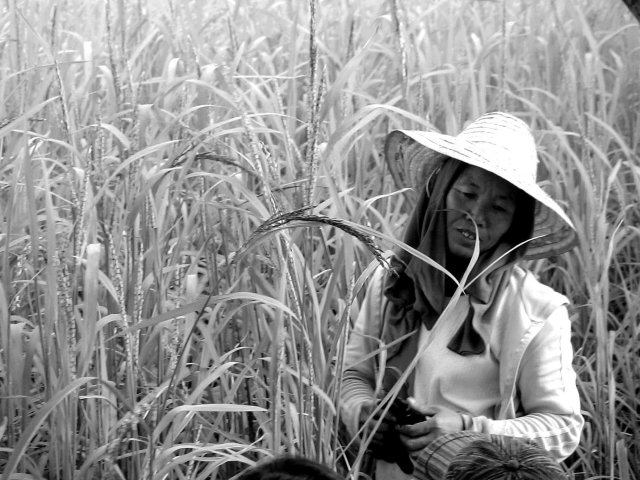 Behind the Semblance of Abundance
Behind the Semblance of Abundance
From the outset, Thailand best exemplifies food security in the Southeast Asian region. For some analysts, it has even been seen as a North within the South, since many of its neighbours have become highly dependent on its rice and other produce. But for Thai farmers, much remains to be seen and understood behind such image of abundance.
As long-time feminist activist Ravadee Prasertcharoensuk asserted, “Compared to 20 to 30 years ago, the producers are having a hard time to provide for the family. Before, people were not that dependent on the cash economy. There was rice all year round.”
Thais may have more than enough food to eat but the rather low prices of produce have not helped farmers to significantly uplift their economic status. The situation is even more difficult for tenants. Bereft of their own land, they are dependent on wages and vulnerable to the unpredictability of family emergencies and even nature itself.
Tenants in the central region normally receive Baht 200 (US$5.69) per day while those in the northeast region obtain not more than Baht 150 (US$4.26) per day. Although these amounts may be enough for families to survive in a day, it is impossible for tenants to earmark some amount as savings for rainy days, especially as many tenants are already in debt.
The low prices have also led to so much pressure on the land. The need to ensure greater yields has reinforced the use of fertilisers and machineries. “Right now, more farmers are becoming managers. They are using lots of machines for planting and harvesting, compared to 20 to 30 years ago, when people were engaged in collective harvesting,” remarked Prasertcharoensuk, who heads the Bangkok-based Sustainable Development Foundation (SDF).
Consequently, the pressure to generate a high volume of produce has not accelerated a shift towards organic farming, as the latter can only match the yields of conventional farming after three to five years. Although more and more farms are allocating parcels of land for organic farming, their produce are usually for family consumption.
“It looks like organic farming is increasing even if it has lower yields and even if the price of the produce is a little higher. For families doing organic farming, they intend to allocate their produce for their own consumption, not for selling. The government has been advocating it but as of now only two governors out of the 76 provinces of Thailand are actively supporting organic farming,” she described.
The drive to have more produce to sell has also led to the encroachment into the forest. For landless farming families, the economic crisis has triggered the younger generation to move either to the bigger farms or factories as labourers. Some families have also been forced to sell their lands, including those which they fought for along with civil society organisations like SDF.
The pressure to survive and provide is indeed more intense for women. But despite their immense contribution to their families, their options for social mobility remain quite limited. As Prasertcharoensuk explained, “They need to ensure food for the family, especially given Thais’ attitude on women so they work harder. And when women work harder, definitely this will have an impact on their health and opportunities for self- development, including their political participation even at the community level.”
Young women often find themselves migrating to more industrial areas to work in the factories or centres like Bangkok. Some find themselves in dangerous trade and services like drugs or the sex industry.
Prasertcharoensuk also admitted that although the number of women leaders is increasing in communities, these are still few compared with men. Moreover, some women leaders come from a social status that is still more comfortable than majority of women farmers. “Women leaders are increasing but not significantly. It would have been good if there are more women leaders because they generally tend to have firmer and more militant positions,” she shared.
With their rather limited options, the response of women farmers to the economic crisis can be described as reactive. “It is not proactive. It is more of responding to the situation with whatever opportunity available. So farmers who already have their own lands and are engaged in conventional farming, for instance, contemplate selling their land.”
Prasertcharoensuk, who was among the participants in the Rural Women’s Workshop organised by Isis International, Via Campesina and People-Centred Development Forum back in 1996 in Rome, Italy, admitted that the challenges confronting women in agriculture have become more complicated and interrelated with other arenas of struggle and advocacy.
As she explained, “We have expanded our advocacy from sustainable agriculture to community’s right to access and control natural resources and other wider issues. We are not only strengthening women’s networks but expanding it with those on fisheries and ethnic groups.”





 The
The 
 Isis Resource Center holds one of the largest feminist collections of materials in the Global South. With 40 years of publication experience, Isis holds a vast collection.
Isis Resource Center holds one of the largest feminist collections of materials in the Global South. With 40 years of publication experience, Isis holds a vast collection.